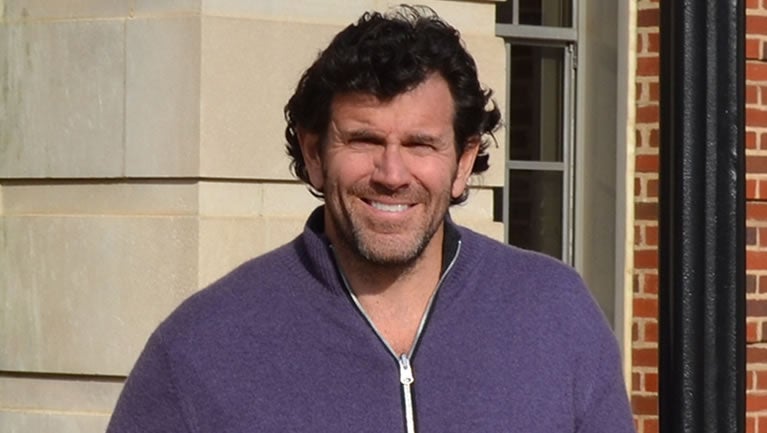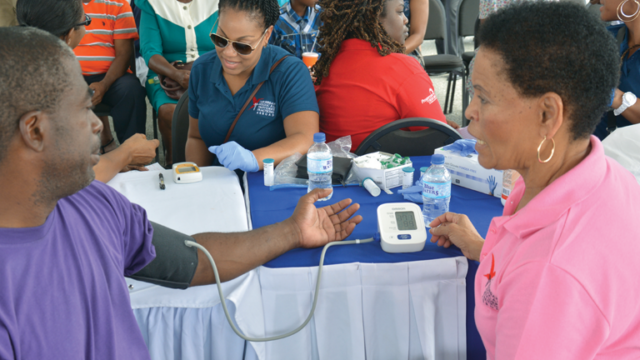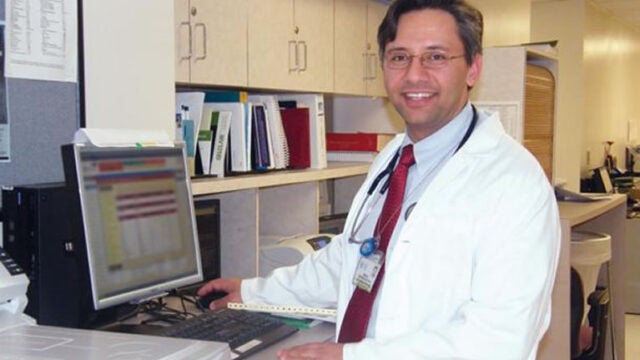
Title:Pursuing a PhD for the Love of Science
Biomedical Graduate Education
How does someone with a degree in electrical engineering spend a career in finance, retire, and then head to Georgetown for a master’s in biotechnology, eventually pursuing a PhD in pharmacology? Georgetown Medicine sat down with Kimbell Duncan (MS’15, PhD’22) to find out.
Tell me about your early career in the investment field.
I graduated from Yale with a Bachelor of Science in electrical engineering, but I had taken a summer job on a trading floor between my junior and senior years and fell in love with the markets. I joined Goldman Sachs out of Yale and within a short period of time became a trader. I worked in finance for 17 years and retired in 2004. During that time, I was fortunate to be on the front lines of a few financial innovations. My time in the investment business taught me that learning never stops, and one needs to continuously expand the number of tools in his toolbox in order to be nimble and prepared for unforeseen opportunities.
What made you decide to study biotechnology?
Following retirement, I began to invest in startup companies as an angel investor. Several of those early investments were in biotech. In addition, my personal life was consumed with healthrelated matters. My mother suffered from mastocytosis and my first wife was diagnosed with breast cancer at the early age of 29. Understanding disease and possible new treatments became an obsession. Many of my friends were either bioscientists or medical professionals, and I sat on the boards of five biotech companies. Ultimately, both my mother and my wife died of their diseases.
When I decided to move to Washington, D.C. from London, I explored the possibility of going back to further my biosciences education more formally. I obtained a master’s degree in biotechnology from Georgetown in 2015 and then gained acceptance into the PhD program in pharmacology here. You might say that I am backfilling my education to support the work I have been doing as an investor and philanthropist, but I hope I might contribute through research as well.
Do you have a specific research interest?
I am interested in the gut-brain axis as it relates to diseases of the central nervous system. I plan to focus on Parkinson’s disease.
Will you use your PhD to change careers or add a new layer onto your current skillset?
My “career” has been over for more than a decade. I study and research for the love of science and the search for ideas that make a difference. I contribute as an investor and board member to support the activities of brilliant scientists and entrepreneurs, and I have seen how my own studies enrich the conversations I have with them. But their ideas are their own and my contribution marginal. Of course, my graduate education informs my activities as an investor and my charitable aspirations, but it is too early in the PhD journey to see what opportunities will arise upon obtaining that milestone.
Last year you represented Georgetown at the Leaders of Tomorrow Summit, meeting with current and future regional biotech leaders. How was that experience?
I was grateful to have the opportunity to participate in the summit. The most rewarding aspect was forming a team with students from other universities in the region to solve a problem and submit a proposal. Gaining insight into the work others are doing in fields that are not directly related to the work I am doing was interesting and rewarding. I continue to remain in contact with one or two of my Leaders of Tomorrow colleagues and follow their advancement.
You sit on a number of biotech boards and charities. How did you get involved with them?
I first began to invest in start-ups in 2006 and, generally, I accept board positions with those companies. Each of the companies was founded by a scientist/entrepreneur who discovered or created an invention with the aim of improving the health of its ultimate beneficiaries. It is inspiring to work with people who tirelessly work to solve problems and advance technologies.
In 2010, I started the Rush Foundation, a charity focused on HIV in sub-Saharan Africa, having become familiar with the science and human toll of the virus through one of my angel investments. I wanted to help make a potential vaccine candidate accessible to the poorest countries that are most affected by the pandemic. The vaccine is currently in phase II trials. We subsequently expanded the activities of the foundation to help those living with HIV. We provide start-up funding for income-generating activities, fund pilot prevention programs for youths, and fund a self-sustaining medical services delivery operation for fishing villages in Uganda. In addition, we have supported academic research aimed at improving the policy response to ensure the long-term provision of HIV interventions in sub-Saharan Africa. It has been challenging but rewarding work.

At the conclusion of an accomplished military career, Gerard Antoine (M'98) reflects on his time at a combat outpost and turns to the challenges of health care in the Caribbean.

“I am certain we will learn a lot about what drives pancreatic cancer, what we can use in our medical toolkit, and what we need to develop as novel treatments.”…

“We believe this unique collaboration will strengthen the voice of our community and improve outcomes for patients.” — Craig Lustig…